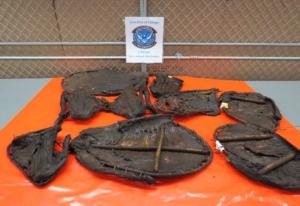CHICAGO–U.S. Customs and Border Protection Agriculture Specialists (CBPAS) and their canines have been busy inspecting arriving passengers at O’Hare International Airport, sniffing mail at the International Mail Facility (IMF) near O’Hare, examining arriving rail and ocean cargo, and checking parcels at a nearby express consignment facility. In the month of January, CBPAS have stopped 5,162 prohibited items to include concealed hatching eggs, dried cow skin, dried rodents and various other plants and meats.
The most common items CBPAS have seized are pork and beef sausages, plants, plant materials, seeds for planting, and wild game meat. More notable seizures in January were:
- Six dried rodents, including porcupine, were discovered in baggage from Liberia that were seized per Centers for Disease Control and Prevention (CDC) regulations. Rodents from Africa are prohibited to prevent the introduction of monkey pox.
- A repeat offender tried to bring in plants, fruits, fresh vegetables, fresh leaves, and dried cow skin. In 2017, this passenger was assessed a monetary penalty of $300 for failing to declare plants and animal products.
- At the express consignment facility, CBPAS inspected a package that contained 13 separate pieces of vacuum-packed Italian pork meat: Prosciutto, Pancetta, Fileto, Salsiccia,‘Nduja, and Soppressata. Italy is currently considered affected with African Swine Fever, Swine Vesicular Disease, and Classical Swine Fever. The items were destroyed through steam sterilization.
- At the IMF, Agriculture K9 Hitch alerted to a parcel from the Congo that contained 30 pounds of unfinished animal body parts consisting of legs, hooves, bones, and skins. Fish and Wildlife Services stated it could be a type of small antelope, like a duiker or possibly a steenbok.
“Chicago’s CBP Agriculture Specialists are focused on their mission to prevent prohibited items from entering into the United States,” said LaFonda D. Sutton-Burke, Director, Field Operations-Chicago Field Office. “The sheer volume of prohibited items our specialists intercept daily clearly shows how they play a critical role in preventing diseases from entering the United States.”
CBP recommends that people who wish to import plant materials, animal materials and other agricultural items consult the CBP Information Center section on the CBP website or call (877) 227-5511. Additionally, arriving passengers should always declare all items acquired abroad to CBP officers to avoid civil or criminal penalties and reduce the risk of introducing pests and disease to the United States.
“CBP’s Agriculture Specialists mitigate the threat of non-native pests, diseases, and contaminants entering the United States,” said Ralph Piccirilli, Acting, Area Port Director-Chicago. “CBP agriculture specialists have extensive training and experience in the biological sciences and agricultural inspections, inspecting tens of thousands of international passengers and cargo shipments at our air, land and sea ports of entry.”
CBP’s border security mission is led at 328 ports of entry by CBP officers from the Office of Field Operations. Please visit CBP Ports of Entry to learn more about how CBP’s Office of Field Operations secures our nation’s borders. Learn more about CBP at www.CBP.gov.



